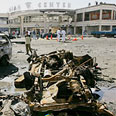
Threatening Israel: Egyptian attack
צילום: איי פי
Sharm and Philadelphi
Saturday's attack exposes Egyptian weakness
Some 5,000 people gathered in a Buddhist temple in Indonesia Saturday to pray for victory for the forces of light over the forces of darkness.
With the current wave of terror attacks, from London to Sharm el-Sheikh, the world has no answer for Islamic terror.
The only answer, it seems, is to pray.
Comfortable side of terrorism
Yesterday, Israel found itself, for a change, on the “comfortable” side of terrorism, comforting the mourners, rather than mourning.
The terrorism of recent years has given rise to a standard, routine, pathetic telephone call: heads of state consoling “in the name of all of us” the affected country, one after the other.
No refuge
Every Islamic attack in the world touches Israel, either directly or indirectly. The chain of attacks in Sharm el-Sheikh Saturday is particularly close to us, because for many Israelis, Sinai beaches are a refuge of relaxation, beautiful scenery, and quiet close to home stay.
But they won’t continue to be as long as terror continues to threaten.
Still, there are other, more pressing, reasons to be concerned about the Sinai attack.
Unstable
It seems the Egyptian authorities are far from stable.
Despite the fact that President Hosni Mubarak has much greater freedom to fight terror than western counties do, he has not managed to wipe out al Qaeda's activities.
Terrorists continue to hit him where it hurts - right before Egypt’s Revolution Day holiday, damaging at the same time Egypt’s standing in the international community. and inflicting damage on the country’s tourism industry.
This chain of attacks happened just before Israel is to ratify a change in the peace treaty with Egypt, allowing a larger Egyptian military presence in Sinai to patrol the Philadelphi Route.
Prime Minister Ariel Sharon agreed to allow Egyptian soldiers along the border with Israel in hopes the Egyptians would prevent weapons smuggling from Egypt to the Gaza Strip, and would allow Israel to withdraw IDF troops from the area.
The ease with which the attack was carried out raises many uncomfortable questions: if in a case of a clear Egyptian interest (preventing attacks) the government cannot prevent attacks, what about preventing weapons smuggling, a case in which it has far less of an interest?
Caught in a Trap
We are in a trap: we can’t completely trust the Egyptian government, even less the Palestinian Authority.
On the other hand, we know that to leave IDF soldiers on the Philadelphi Route, in between them, is the worst possible option. We’d have weapons smuggling, occupation, and dying soldiers.
In recent months IDF lawyers have turned to several experts in international law, in an attempt to clarify just how much the disengagement will change Israel’s legal standing.
The response was almost unanimous: unless Israel withdraws from the Philadelphi Route and allows Gaza's sea and airports to function, it would not relieve itself of the responsibility of an occupying power.
With or without Egypt, this is the defining point. Sharon already understands this. Many security organizations have trouble understanding it. The occupation is part of their mentality. It’s part of their souls.










